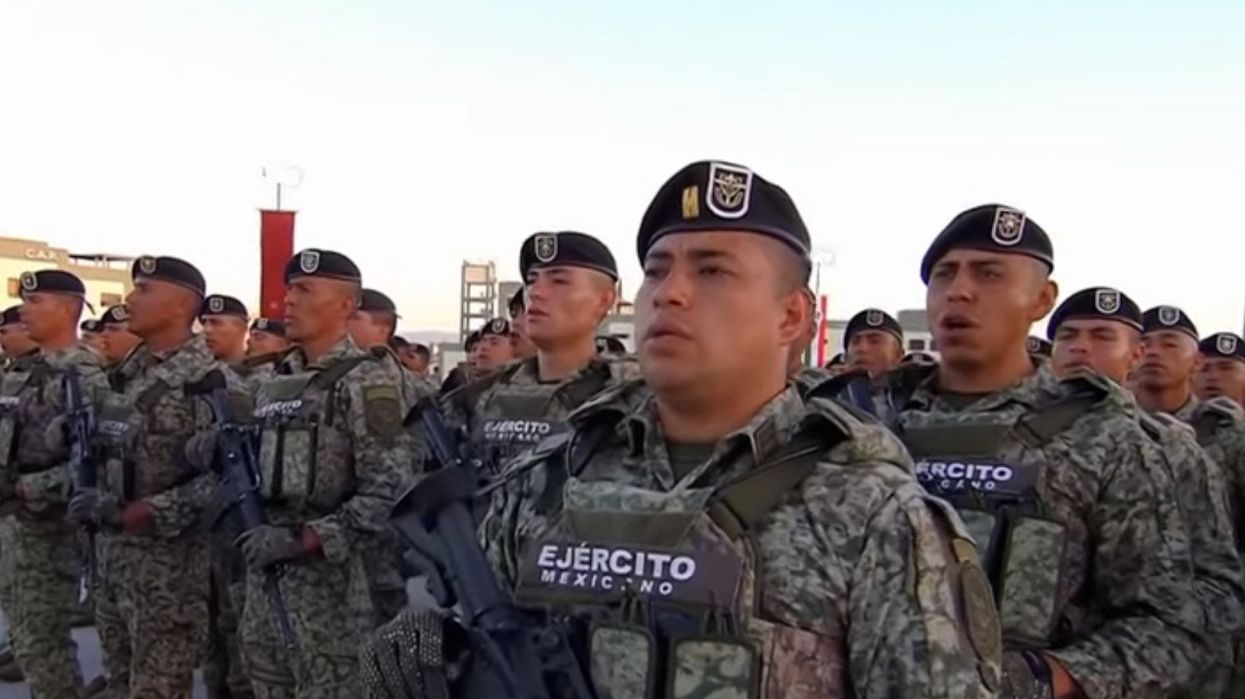
Mexican Army
There is no border in the world anything like the one between the United States and Mexico: a wealthy industrialized nation sharing a 2,000-mile frontier with a developing country barely able to raise its millions above subsistence-level poverty. It’s as if France were to border directly upon Algeria, or Germany upon Somalia.
American writers from Ambrose Bierce, who vanished during the Mexican revolution of 1913, to Cormac McCarthy, whose All the Pretty Horses depicted Mexico as a place of enchantment and deadly violence, have always seen it as a land of extremes. Sam Peckinpah’s 1969 film The Wild Bunch dramatizes near-phantasmagoric violence.
The brilliant Mexican poet and essayist Octavio Paz maintained that mutual incomprehension between the two countries was permanent and inevitable. America’s legacy, Paz wrote in The Labyrinth of Solitude, “is Democracy, capitalism and the Industrial Revolution,” while Mexico’s is “the counter-reformation, monopoly, and feudalism.”
The American belief in the inevitability of progress doesn’t really exist there, although half the Mexican population would probably emigrate to “el Coloso del Norte” if they could.
I once visited the home of a seasonal worker in a remote, picturesque village in Jalisco, whose mother insisted the whole town would follow him to California if they could.
“Todos, todos, todos,” she said. “No hay nada para nosotros en Mexico.” (“All of us. There is nothing for us in Mexico.”)
So naturally, Republicans want to bomb them. Because, of course, nothing has ever succeeded like America’s vaunted war on drugs, and looking manly and warlike is Job One among GOP politicians. Writing in The Atlantic, former George W. Bush speechwriter David Frum compiles an alarming list of conservative politicians who think the best way to fix the eternal crisis at the U.S.-Mexican border is to bomb and/or invade that country.
Supposedly, presidential candidate Donald Trump has asked his advisers for a plan of attack. His mini-me rival, Florida Gov. Ron DeSantis, has proposed a naval blockade of Mexican ports. The idea is to interdict chemicals Mexican drug cartels use to manufacture fentanyl. (Suggestion: Take a look at a map showing that country’s thousands of miles of coastline on the Caribbean Sea, the Pacific Ocean, and the Gulf of Mexico. DeSantis’ suggestion is absurd on its face.)
GOP senators are breathing smoke and fire. Last year, Sen. Tom Cotton of Arkansas wrote a New York Times op-ed arguing: “We can also use special operators and elite tactical units in law enforcement to capture or kill kingpins, neutralize key lieutenants, and destroy the cartel’s super labs and organizational infrastructure. We must work closely with the Mexican government ... but we cannot allow it to delay or hinder this necessary campaign.”
South Carolina Sen. Lindsey Graham argues that “Our nation is being attacked by foreign powers called drug cartels in Mexico ... They are at war with us. We need to be at war with them.”
Somebody will have to tell me where and when a nation has bombed its way out of a drug addiction crisis. But then, I had the great advantage of riding in Mexican Army helicopters more than 40 years ago during “Operación Condór,” back when the drug killing Americans was heroin and the cartels were mainly a regional problem in the state of Sinaloa.
I thought they ought to call it “Operación Pato Muerto,” i.e., dead duck, because the authorities had no chance of eradicating heroin poppies grown by destitute campesinos from a remote area in the Sierra Madre as large as California, where government authority scarcely existed.
Indeed, I’ve never met a Mexican who believes that country’s government has either the will or the ability to eradicate drug smuggling as long as we Yanquis keep buying the stuff. Not even Roberto Montenegro, the courageous Mexican reporter who arranged my helicopter ride and who was murdered on the cathedral square in Culiacán a couple of months after I left.
This, too, as Frum astringently points out: Mexicans do have a democracy, and they do get to vote. What’s more, they know a whole lot more about us than we know about them, and most feel that we’ve corrupted them more than the other way around. No Mexican politician can afford to be seen as countenancing a U.S. insult to that country’s sovereignty.
“Mexicans are dying,” Frum points out, “because of American drug purchases. Mexico has about one-third the population of the United States but four times the homicide rate.” Most are dying in gang wars over market share. “Does Mexico do too little to halt the flow of opioids northward? The United States does nothing to halt the flow of guns southward.”
Every Mexican citizen knows this proverb: “Poor Mexico, so far from God, so close to the United States.”
Gene Lyons is a National Magazine Award winner and co-author of The Hunting of the President.
Reprinted with permission from Sun Times.








